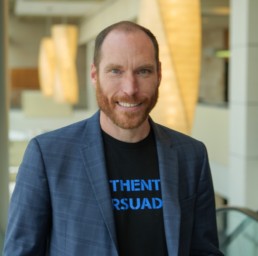The Professionalism Divide: Why Sales Is Not A Profession (Yet)
Sales is sometimes viewed differently from other professions such as plumbing, electrical work, construction, medical, and law. Sales often fails to actually hold up in comparison to these sectors, which require specific education, licensure, and professional ethics. I want to share the causes of why sales is not actually a “profession” – which will trigger a lot of people.
Now one big thing to differentiate – you can be a professional in sales. Generally, a professional is someone who makes money at something (I am a “professional” speaker because people pay me to speak, I am definitely not a professional golfer…no one would want to even watch me for free, or if I paid them!). To truly be a professional its about holding yourself to a higher standard (Check out Steven Pressfield’s book, The War of Art )
We are going to look at the causes of the impression that sales isn’t a “profession” and its effects on the business and its practitioners.
Advertisement
Are You Losing Sales?
You might be and you don’t even know it! Selling in a post-COVID world requires new approaches. That is why the Selling With Authentic Persuasion training is essential for those who want to thrive in the modern economy.
One
One reason sales may not be considered professional is the lack of established educational qualifications. Sales accepts people without formal education, unlike medical and law. Some organizations offer sales training and certificates, but there’s no standard, thus expertise levels vary. My first day in sales I was told to answer the phone and fill out lead sheets. No training, no understanding of sales best practices, and not exactly what we were even selling.
Sales lacks standardized education due to its diversity. Unlike medicine and law, where knowledge is highly specialized and uniform between practitioners, sales covers many products, services, and sectors. From selling software to cars to real estate, skills and knowledge vary greatly. This makes it hard to create a sales education framework for all.
The ever-changing nature of sales worsens this difficulty. Sales methods and technologies change constantly. What worked yesterday may not work today, making education standardization challenging. This dynamism requires salespeople to be agile and versatile, attributes not typically associated with traditional occupations.
Two
The Uncertainty of Sales Boundaries: Sales is generally unregulated, unlike other professions. Plumbing, electrical work, construction, medicine, and law have formed codes of conduct. These guidelines protect clients, promote professionalism, and assure accountability. The lack of stringent restrictions in sales creates a range of professionalism and ethics, making it difficult to classify as a traditional vocation.
Sales, which often involve interpersonal interactions, may resist stringent supervision. How can you control charm, persuasion, and rapport? These intangibles are often as crucial as product knowledge and vary greatly among salespeople.
Sales includes B2B (business-to-business) salespeople in corporate settings and retail personnel on the front lines, therefore it doesn’t fit neatly into a career. These roles each have unique challenges and demands, challenging the creation of uniform professional standards.
Advertisement
Are You Losing Sales?
You might be and you don’t even know it! Selling in a post-COVID world requires new approaches. That is why the Selling With Authentic Persuasion training is essential for those who want to thrive in the modern economy.
Three
The Missing License in Sales: Licenses are necessary for autonomous practice in disciplines such as medicine and law, demonstrating competence and ethics. Conversely, salespeople rarely need licenses, reducing monitoring and accountability.
This absence of licensing is due to fragmented and diversified sales. Unlike doctors, whose roles are usually uniform worldwide, salespeople’s tasks vary by industry, company, and target audience. Managing this diversity through licensing would be difficult.
Unethical sales tactics are also raised by the lack of licensing. Without an ethical code, some salespeople may use deception or aggression to close deals. This can damage salespeople’s and the industry’s reputations.
Four
Sales Expertise Variation: Sales skills are diverse among practitioners. Some have strong product knowledge, negotiation skills, and consumer behavior insights, while others use charm and seduction without understanding their products. Variability implies that sales isn’t a career with uniform standards.
Sales competence varies for numerous reasons. First, salespeople must specialize in niches due to the variety of items and services supplied. This specialization might vary greatly, as medical equipment sales representatives need very different knowledge than real estate agents.
Additionally, the sales business lacks a systematic accreditation system like medical board certificates or legal bar tests. Medical and legal professionals must pass tough exams to show their skills. However, sales professionals have no standardized test, making it difficult to compare expertise.
Are You Losing Sales?
You might be and you don’t even know it! Selling in a post-COVID world requires new approaches. That is why the Selling With Authentic Persuasion training is essential for those who want to thrive in the modern economy.
Five
The Money-Driven Aspect of Sales: Sales is generally driven by personal gain rather than professional progress. This financial focus may give the impression that sales favors money over growth.
Sales incentives motivate salespeople to earn money. This can push people to succeed, but it can also make sales seem like a “mercenary” career driven by money. This view may lead to the belief that sales lacks professionalism.
High turnover rates can also result from sales money. Salespeople driven by short-term financial gain may cycle through particular sales roles. This rapid turnover can weaken professional communities and make sales seem transitory.
The lack of recognition as a “profession” has important repercussions for sales professionals. Building client trust without clear boundaries and standards is difficult. Additionally, the lack of professional recognition can hinder talented people who want stability and respect in established professions.
The impression that sales is not a career might also inhibit recruitment. Top talent may be drawn to sectors with clear educational paths and professional recognition, making it hard for sales to attract and keep them.
Now for the good news…
While the subject of whether sales is a “profession” is complex and diverse, and clearly you can see that sales lacks standardized schooling, solid boundaries, licensing requirements, and constant professional standards, unlike plumbing, electrical work, construction, medicine, and law. Yet, the experience and contributions of skilled sales professionals to business growth must be acknowledged.
Sales may not be a profession, but it should aspire for industry professionalism. This may require clearer standards, ethics, and education. Sales may gain notoriety and attract and keep excellent personnel by doing so.
What is most exciting right now, more than any other time in our history, is that there are now professional sales courses and even bachelors and masters programs available at hundreds of colleges in the US. Professors who are working together (such as the University Sales Center Alliance – https://universitysales.org/) to create an industry standard for how sales is taught, similar to what we have just come to expect for subjects like math, physics, English, etc.
There will be a day when sales is a profession, with entrance requirements, code of conduct and standards, and consequences – all leading to an experience that buyers can rely on, in the same way you can (hopefully) trust the licensed electrician you hire will help and not hurt your wiring problem.
Until that day, it is up to all of us to act like professionals, hold ourselves to high standards. It’s why I even created my own sales oath – The Authentic Persuader Oath (if you want a copy of it, email me). Here is to all of us selling like a professional!
Listen to an audio version of this article below.
Voiced by the Author, Jason Cutter.

Jason Cutter, CEO of Cutter Consulting Group, is a mindset and scalability expert focused on developing Authentic Persuaders®. Even though his bachelor’s degree is in Marine Biology, he knows what it takes to be successful in sales and build profitable teams. His books, podcasts, training workshops and speaking are focused on helping sales professionals close more deals, make more money, and produce scalable results.
Contact Information
SEI Website: www.
Authentic Persuasion: https://
Authentic Persuasion Show/The Sales Experience Podcast: https://www.
LinkedIn: https://www.
Instagram: https://www.
Header Image Credit: Dana Tentis. Find it here.
Related Articles
Sales. Leadership.
February 13, 2024
Better Outreach
December 11, 2023
What’s Your Motivation?
August 16, 2023
Making Sales Simpler
July 9, 2023
That’s A BAD Idea!
June 12, 2023
The Game of Sales Has Changed
June 6, 2023







